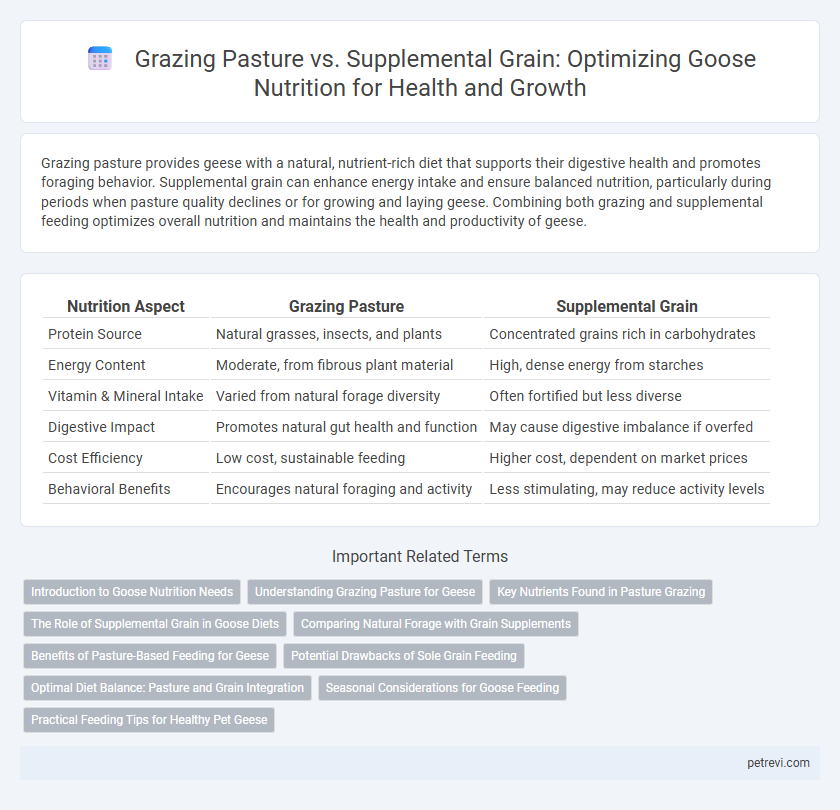Grazing pasture provides geese with a natural, nutrient-rich diet that supports their digestive health and promotes foraging behavior. Supplemental grain can enhance energy intake and ensure balanced nutrition, particularly during periods when pasture quality declines or for growing and laying geese. Combining both grazing and supplemental feeding optimizes overall nutrition and maintains the health and productivity of geese.
Table of Comparison
| Nutrition Aspect | Grazing Pasture | Supplemental Grain |
|---|---|---|
| Protein Source | Natural grasses, insects, and plants | Concentrated grains rich in carbohydrates |
| Energy Content | Moderate, from fibrous plant material | High, dense energy from starches |
| Vitamin & Mineral Intake | Varied from natural forage diversity | Often fortified but less diverse |
| Digestive Impact | Promotes natural gut health and function | May cause digestive imbalance if overfed |
| Cost Efficiency | Low cost, sustainable feeding | Higher cost, dependent on market prices |
| Behavioral Benefits | Encourages natural foraging and activity | Less stimulating, may reduce activity levels |
Introduction to Goose Nutrition Needs
Goose nutrition requires a balanced intake of energy, protein, vitamins, and minerals to support growth, feather development, and overall health. Grazing pasture offers natural forage rich in fiber, vitamins, and minerals essential for digestive health, while supplemental grain provides concentrated energy and protein necessary during periods of high demand or limited pasture availability. Understanding the nutritional composition of both grazing pasture and supplemental grain enables optimal diet formulation tailored to the physiological needs of geese.
Understanding Grazing Pasture for Geese
Grazing pasture for geese provides a natural, nutrient-rich diet that supports their digestive health and reduces feed costs by allowing access to fresh grasses, legumes, and insects. Pasture grazing enhances vitamin intake, promotes natural foraging behaviors, and improves overall flock vitality compared to relying solely on supplemental grain. Understanding the balance between grazing and grain supplementation is essential to optimize nutrient absorption and maintain optimal growth rates in geese.
Key Nutrients Found in Pasture Grazing
Pasture grazing provides geese with essential nutrients such as high levels of fiber, beta-carotene, and natural antioxidants that support digestion and immune health. Fresh pasture is rich in vitamins A, E, and K, along with trace minerals like calcium and magnesium that promote bone strength and metabolic functions. Compared to supplemental grain, pasture grazing offers a more balanced nutrient profile that aligns closely with the goose's natural dietary needs.
The Role of Supplemental Grain in Goose Diets
Supplemental grain in goose diets enhances growth rates and improves feed conversion efficiency by providing concentrated energy and essential nutrients not always available in grazing pastures. Grains rich in carbohydrates and proteins help meet the dietary demands during periods of inadequate forage quality or quantity. Incorporating supplemental grain supports optimal body condition and reproductive performance, particularly during colder months or intensive production systems.
Comparing Natural Forage with Grain Supplements
Grazing pasture provides geese with natural forage rich in fiber, vitamins, and minerals essential for maintaining digestive health and overall vitality. Supplemental grain offers concentrated energy and protein, promoting faster growth and higher weight gain, but may lead to imbalanced nutrition if used excessively. Optimal goose nutrition combines grazing pasture's benefits with controlled grain supplementation to support sustainable health and productivity.
Benefits of Pasture-Based Feeding for Geese
Pasture-based feeding for geese enhances nutrient intake by providing diverse grasses and insects, improving overall health and digestion. Grazing supports natural foraging behavior, boosting immune function and disease resistance while reducing feed costs compared to supplemental grain. Increased omega-3 fatty acids and antioxidants from fresh pasture contribute to higher-quality meat and eggs.
Potential Drawbacks of Sole Grain Feeding
Sole grain feeding in goose nutrition can lead to nutrient imbalances, as grains lack essential vitamins, minerals, and fiber found in grazing pasture. This diet may result in digestive issues such as crop impaction or fatty liver disease due to insufficient roughage. Furthermore, exclusive grain consumption increases the risk of obesity and poor feather condition, negatively impacting overall health and productivity.
Optimal Diet Balance: Pasture and Grain Integration
Grazing pasture provides geese with essential nutrients, fiber, and natural foraging behavior stimulation, promoting gut health and overall well-being. Supplemental grain offers concentrated energy and protein necessary for growth, egg production, and maintenance during low pasture availability. Integrating pasture grazing with targeted grain supplementation ensures an optimal diet balance, enhancing nutrient absorption and supporting sustainable, healthy flock development.
Seasonal Considerations for Goose Feeding
Seasonal factors significantly influence the balance between grazing pasture and supplemental grain in goose nutrition, with spring and summer providing abundant natural forage that fulfills most dietary needs. During fall and winter, lower pasture quality and availability necessitate increased supplemental grain to maintain energy levels and support body condition. Adjusting feed strategies seasonally ensures optimal nutrient intake, promoting health and productivity throughout the year.
Practical Feeding Tips for Healthy Pet Geese
Geese thrive on grazing pasture, which provides essential nutrients and natural foraging behavior, promoting digestive health and strong immunity. Supplementing their diet with grain, such as cracked corn or oats, ensures sufficient energy, especially during growth or cold weather when pasture quality declines. Offering fresh water alongside a balanced mix of forage and grain supports optimal nutrient absorption and maintains overall vitality in pet geese.
Grazing pasture vs Supplemental grain for Goose Nutrition Infographic

 petrevi.com
petrevi.com